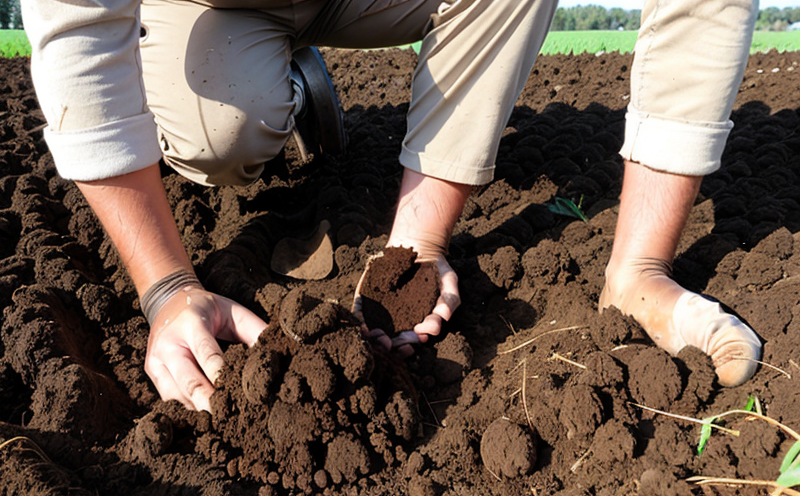Soil Moisture Content Testing
The measurement of soil moisture content is a crucial aspect in agriculture and forestry testing. Soil moisture plays an essential role in determining plant growth, root health, and overall crop yield. Accurate measurements help ensure optimal irrigation schedules, improve water use efficiency, and contribute to sustainable agricultural practices.
Soil moisture affects various factors including nutrient availability, microbial activity, and physical properties such as soil structure stability. In agriculture, knowing the exact amount of water in the soil is vital for precision farming techniques that aim to reduce waste and maximize resource usage. For forestry applications, understanding soil moisture helps in managing forest health by preventing overwatering or dehydration.
Testing methods vary based on specific requirements but typically involve taking samples from different depths within a field or woodland area. These samples are then analyzed using various equipment depending on the desired precision level and budget constraints. Commonly used tools include capacitance sensors, tensiometers, neutron probes, gravimetric methods, and destructive sampling techniques.
The standard procedure for soil moisture content testing follows ISO 10324:2015 which specifies procedures for determining soil water content in the field by drying to a constant weight. This method is reliable when conducted correctly but may not capture all variations present within complex soils or during rapid changes in weather conditions.
For more advanced scenarios where real-time monitoring capabilities are required, capacitance sensors provide continuous data collection without requiring frequent manual sampling. Tensiometers offer another option by measuring soil water tension directly which gives insights into plant root zone availability.
Incorporating soil moisture content testing into routine operations enhances decision-making processes related to irrigation scheduling and fertilization practices leading to better resource management strategies that promote sustainable land use patterns.
Industry Applications
The application of soil moisture content testing spans across multiple industries including agriculture, horticulture, landscaping, environmental science, and forestry. In agriculture, this service supports precision farming initiatives by providing accurate data on water availability at different depths within fields allowing farmers to fine-tune their irrigation practices.
For greenhouse operators, precise measurements aid in maintaining optimal growing conditions while conserving water resources. Similarly, landscape designers can utilize these insights to create sustainable outdoor spaces that require minimal maintenance yet thrive under given environmental conditions.
In forestry applications, regular soil moisture monitoring helps monitor forest health indicators such as tree stress levels due to drought or excessive rainfall events. This information allows foresters to make informed decisions about treatment plans aimed at improving stand vigor and resilience against pests and diseases.
Environmental scientists also benefit from this service by assessing impacts of climate change on ecosystems through long-term trend analysis facilitated by historical records maintained over years.
Customer Impact and Satisfaction
Clients who invest in regular soil moisture content testing reap numerous benefits including improved decision-making capabilities, enhanced resource efficiency, reduced costs associated with unnecessary water usage, and increased crop yields.
Quality managers appreciate the detailed reports generated after each test cycle which provide them with actionable insights into current field conditions. Compliance officers find value in knowing they meet regulatory requirements related to sustainable land use practices.
R&D engineers leverage this data to develop new technologies aimed at improving soil health and promoting plant growth through innovative solutions like smart irrigation systems or biochar amendments designed specifically for particular soil types.
Procurement teams use these tests results when selecting suppliers of agricultural inputs such as seeds, fertilizers, pesticides etc., ensuring they meet stringent quality standards before being introduced into production processes.
Environmental and Sustainability Contributions
By accurately measuring soil moisture content, organizations contribute positively to environmental sustainability efforts by minimizing water wastage while maximizing crop productivity. This aligns well with global initiatives promoting sustainable agricultural practices such as those outlined in the United Nations' Sustainable Development Goals.
The accurate measurement of soil moisture also supports reforestation projects where maintaining optimal conditions for young trees is critical during early stages of growth. By monitoring and adjusting irrigation schedules based on real-time data, foresters can ensure successful establishment rates without causing environmental damage from overwatering or inadequate watering practices.
Furthermore, this service helps reduce greenhouse gas emissions by preventing excessive decomposition processes that occur when soils remain waterlogged for extended periods. Conversely, it prevents desiccation leading to increased microbial activity which contributes positively towards carbon sequestration capabilities of the soil ecosystem.





